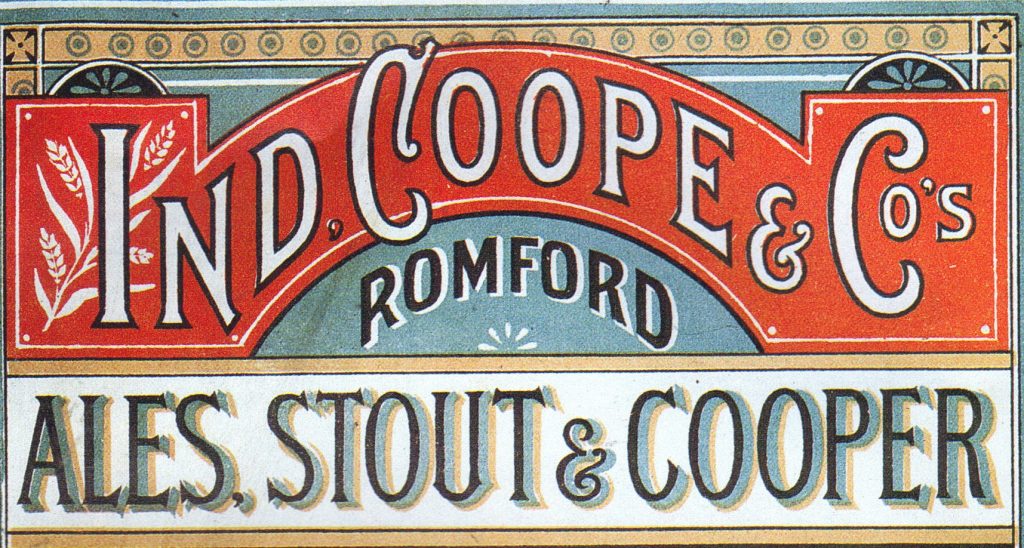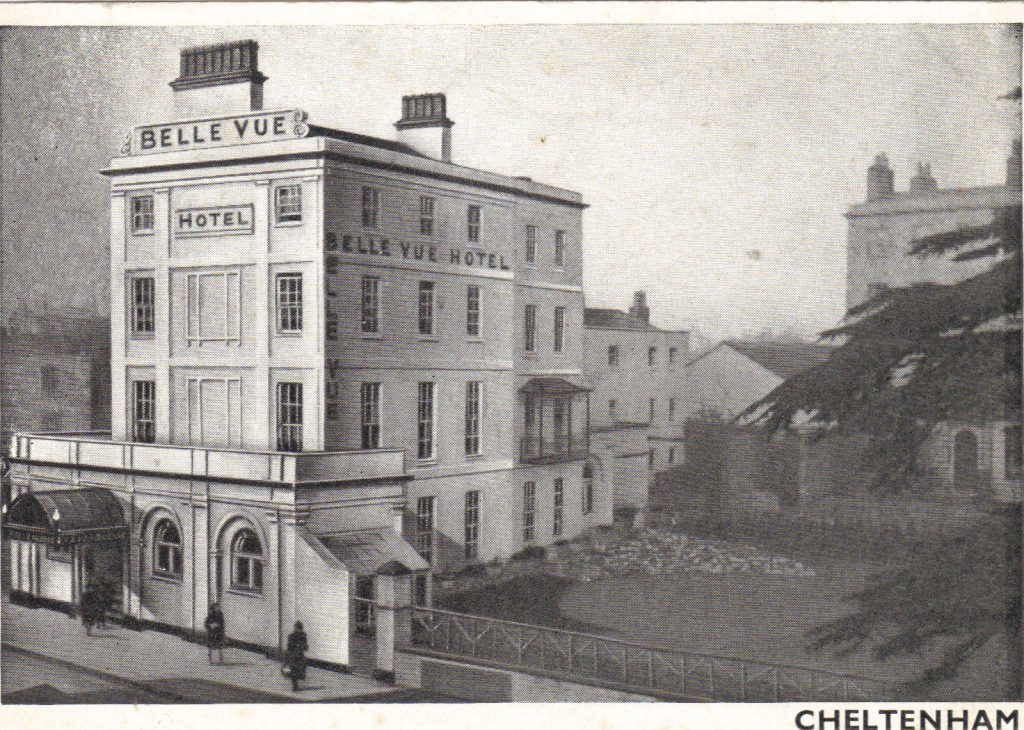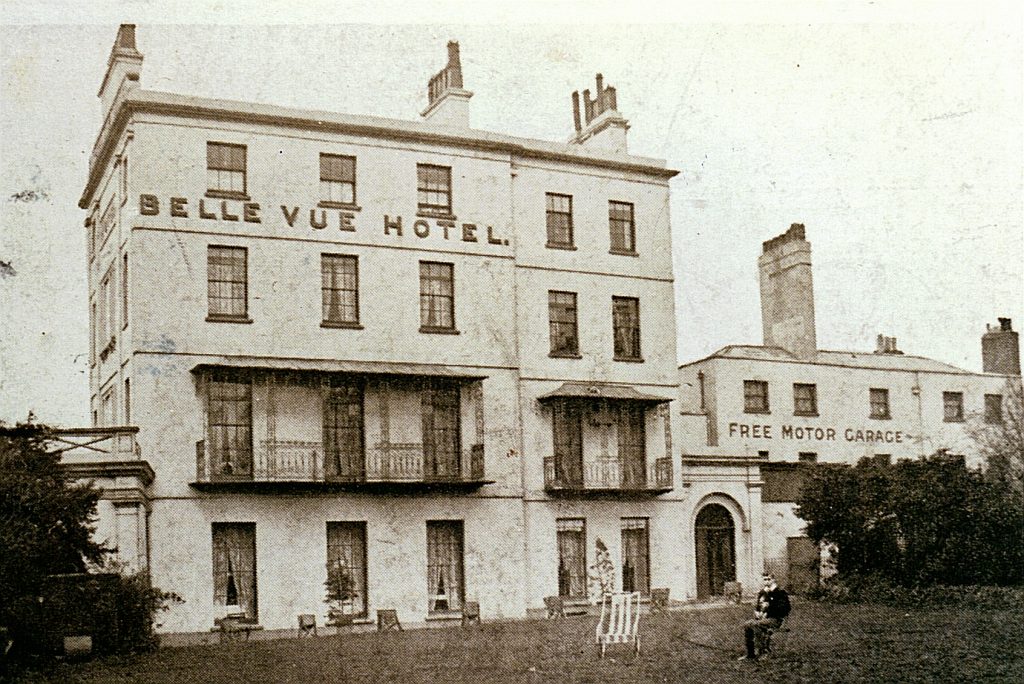Rowe’s Illustrated Guide Cheltenham Guide published in 1850, gives the following rather laborious account:
We have next to notice the Belle Vue Hotel, which stands conspicuously a short distance from the Baths. The situation of this house will ever give it great claims to patronage, and while we say that its name is not a misnomer, so can we confidently assert that the internal accommodations are upon the best scale, under the careful and judicious superintendence of Mr B. Thomas, who is also a Wine Merchant and General Auctioneer. From this point, looking upwards, we have a charming bit of street scenery, of a kind so peculiar to Cheltenham, combining verdant beauties with those of the elegant and comfortable English domicile. This is the London Road entrance to the town.
1872 advertisement: “Belle Vue Cellars established 1839. George Rolph. Wine and Spirit Merchant. Agent for Ind Coope’s celebrated Romford Ales, Stout and Porter. Bass and Allsopps Ales. Guinness Extra Dublin Stout in cask and bottle”.

Of interest is the reference to Ind Coope’s Romford Ales. Ind Coope will be remembered by many beer drinkers as a brewery based in Burton on Trent, Ind Coope’s Burton Ale being a favourite tipple for beer drinkers in the 1980’s. However, the origins of Ind Coope are firmly rooted in Essex. Quoting from the Brewery History Society ‘Century of British Brewers’ published in 2004 Ind Coope was ‘founded 1708 at the Star Inn by George Cardon. In 1799 Star Inn and brewery purchased by Edward Ind and J. Grosvenor. C.E Coope joined the firm in 1845. Registered November 1886 as Ind Coope & Co. Ltd. In receivership January 1909 and was re-registered 1912 as Ind Coope & Co (1912) Ltd. Name reverted to Ind Coope & Co Ltd in 1923. Merged with Samuel Allsopp & Sons Ltd in 1934 and became Ind Coope & Allsopp Ltd. Name changed as above in 1959.’ The Brewery History Society research that Messrs Edward Ind and C.E. Coope did not come together as Ind Coope until 1845 seems to contradict the 1839 reference at the Belle Vue Cellars by six years. Perhaps more to the point is why Ind Coope had interests in supplying their Romford beers to Cheltenham. Maybe the costs involved in transporting their ales across the country were a contributory factor leading to the liquidation of the fledgling company.

George Rolph was still the owner of the Belle Vue Hotel 19 years later in 1891 although it was then leased to the local Cheltenham Original Brewery. The annual rateable value of the fully licensed ale house was £29.15s.0d. The rateable value rose over eighty pounds over the next twelve years! In 1903 the annual payment was £110s.10s.0d. The only explanation that I can offer for the significant rise is that the latter value also included land on the property. In 1903 Augustus William Gaade was the owner and it appears that the lease with the local town brewery had either expired or been relinquished as it was trading free from brewery tie.

In 1863 the Reverend Lutwidge Dodgson stayed at the Belle Vue Hotel. Better known as the novelist Lewis Carroll, he used the hotel as a base whilst visiting his friends, the Liddell family who lived at Hetton Lawn near London Road. It was while he was visiting Hetton Lawn he met Alice Liddell which gave him the inspiration to write ‘Alice Through the Looking Glass.’
When the Rolling Stones played at the Cheltenham Odeon in 1964 on September 10th, they stayed overnight at the Belle Vue Hotel. Whilst they were there Mick Jagger gave an impromptu performance with local band Tony Faye and the Fentones, singing and playing harmonica with them for a few numbers.
The Irving family were prominent, influential and well-respected Cheltenham residents who owned hotels in the town. Charles Irving will be remembered as the long-serving Conservative MP for Cheltenham from 1974-1992. Charles Irving was a director of the Belle Vue Hotel which was renamed the Irving Hotel.
In 1970 Egon Ronay’s Guide noted that ‘although the Irving situated in the busy High Street, the hotel overlooks peaceful Sandford Park. Redecoration has produced good comfort throughout. The bars and restaurant are pleasant while the fifty bedrooms have benefited from modernisation. There is a choice of Bars – the popular Cotswold and Sportsmans bars. The hotel has colour television in the lounge; outside a large and pleasant garden. In addition to the small hotel car park there is a Municipal Car Park adjoining.’
The Irving closed in September 1975. The decision to close the hotel was prompted by legislation relating to modern fire regulations. Despite £14,250 being spent on installing equipment to meet fire regulations in 1971, the fire authority decreed that improvements had to be made to the premises to meet current stringent safety standards including new equipment, structural work and extensive redecoration. Mr Richard Muirie, chairman of Irving Hotels said: “The board of directors has reached this decision [to close the Irving] with reluctance after detailed considerations of the cost necessary to implement the order from the fire authority pursuant to the new legislation.” It was estimated that the work would cost in excess of £20,000.
Outline planning permission was granted for conversion of the Irving Hotel into flats in 1976, with part of the building to the rear demolished to make way for offices. Bovis Homes carried out the conversion in 1977 and work included the complete restoration of the protected Regency building fronting the High Street, and its conversion into flats of one and two bedrooms, bedsitters and a handful of split-level studio flats on the top floor.
Landlords / Proprietors at the Belle Vue Hotel include:
1850 Mr B. Thomas
1856,1859 Mrs Martha Thomas
1870,1885 George Rolph
1891 George Henry Bayley
1902 Mrs Ann Connor
1903,1906 Augustus William Gaade
1919 Captain C.E. Greenall
1927 William Palmer

